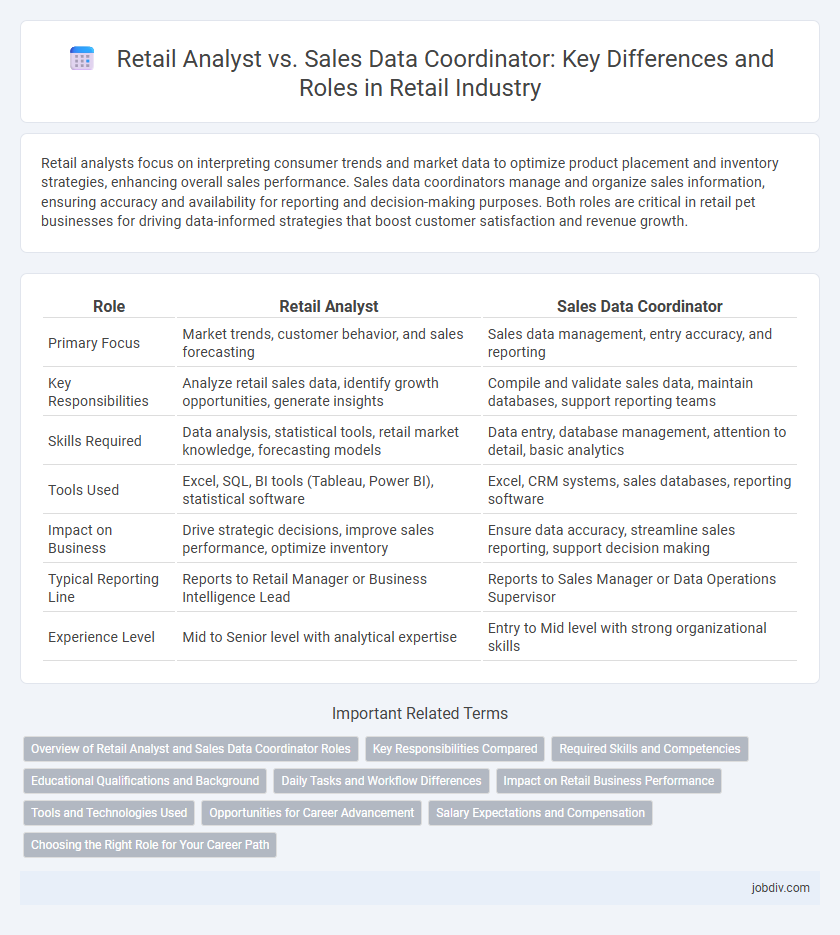Retail analysts focus on interpreting consumer trends and market data to optimize product placement and inventory strategies, enhancing overall sales performance. Sales data coordinators manage and organize sales information, ensuring accuracy and availability for reporting and decision-making purposes. Both roles are critical in retail pet businesses for driving data-informed strategies that boost customer satisfaction and revenue growth.
Table of Comparison
| Role | Retail Analyst | Sales Data Coordinator |
|---|---|---|
| Primary Focus | Market trends, customer behavior, and sales forecasting | Sales data management, entry accuracy, and reporting |
| Key Responsibilities | Analyze retail sales data, identify growth opportunities, generate insights | Compile and validate sales data, maintain databases, support reporting teams |
| Skills Required | Data analysis, statistical tools, retail market knowledge, forecasting models | Data entry, database management, attention to detail, basic analytics |
| Tools Used | Excel, SQL, BI tools (Tableau, Power BI), statistical software | Excel, CRM systems, sales databases, reporting software |
| Impact on Business | Drive strategic decisions, improve sales performance, optimize inventory | Ensure data accuracy, streamline sales reporting, support decision making |
| Typical Reporting Line | Reports to Retail Manager or Business Intelligence Lead | Reports to Sales Manager or Data Operations Supervisor |
| Experience Level | Mid to Senior level with analytical expertise | Entry to Mid level with strong organizational skills |
Overview of Retail Analyst and Sales Data Coordinator Roles
Retail Analysts interpret market trends, consumer behavior, and sales data to inform strategic decisions, leveraging advanced analytics tools to optimize inventory and maximize profitability. Sales Data Coordinators manage and maintain accurate sales records, ensuring data integrity and timely reporting to support operational efficiency and sales forecasting. Both roles are critical in retail environments, with Analysts focusing on insight generation and Coordinators emphasizing data accuracy and organization.
Key Responsibilities Compared
Retail Analysts primarily focus on interpreting sales trends, customer behaviors, and market data to inform strategic decisions and optimize inventory management. Sales Data Coordinators manage the accuracy, organization, and distribution of sales information, ensuring timely reporting and data integrity for operational use. While Retail Analysts drive insights for long-term business growth, Sales Data Coordinators support daily sales operations through meticulous data handling.
Required Skills and Competencies
Retail Analysts require advanced analytical skills, proficiency in data visualization tools like Tableau or Power BI, and strong knowledge of market trends and consumer behavior to interpret complex sales data and generate actionable insights. Sales Data Coordinators need expertise in database management, accuracy in data entry, and familiarity with CRM software to maintain and organize sales records efficiently. Both roles demand strong communication skills and the ability to collaborate with cross-functional teams to support retail business objectives.
Educational Qualifications and Background
Retail Analysts typically hold a bachelor's degree in business, economics, or statistics, with advanced knowledge in data analytics and market research. Sales Data Coordinators often have a background in business administration or information management, emphasizing skills in data entry, reporting, and CRM software. Both roles benefit from proficiency in Excel and SQL, but Retail Analysts require stronger analytical and statistical expertise.
Daily Tasks and Workflow Differences
Retail Analysts focus on interpreting sales trends, customer behavior, and market data to guide strategic decisions, often utilizing advanced analytical tools and generating detailed reports. Sales Data Coordinators manage the accuracy and organization of sales data, ensuring seamless data entry, validation, and distribution across departments to support operational functions. The workflow of Retail Analysts centers on data interpretation and forecasting, while Sales Data Coordinators prioritize data integrity and routine processing within the sales reporting cycle.
Impact on Retail Business Performance
A Retail Analyst drives retail business performance by leveraging advanced data analytics to identify trends, optimize inventory, and forecast sales, enabling strategic decision-making that increases profitability. A Sales Data Coordinator supports this process by ensuring accurate and timely data collection, management, and reporting, maintaining data integrity vital for reliable analysis. Together, their roles enhance operational efficiency and enable data-driven strategies that improve customer experience and revenue growth.
Tools and Technologies Used
Retail Analysts utilize advanced analytics platforms such as Tableau, Power BI, and SAS to interpret consumer behavior and market trends, leveraging SQL and Python for data extraction and predictive modeling. Sales Data Coordinators focus on managing CRM systems like Salesforce and SAP, ensuring accurate sales record-keeping and reporting through Excel, Microsoft Access, and ERP software integration. Both roles depend heavily on data management tools, but Retail Analysts emphasize data visualization and predictive analytics, while Sales Data Coordinators prioritize data accuracy and transactional data processing.
Opportunities for Career Advancement
Retail Analysts leverage data analytics and market trends to provide strategic insights, unlocking opportunities for roles in business intelligence and marketing management. Sales Data Coordinators focus on accurate data entry, reporting, and sales tracking, paving the way toward positions in sales operations and supply chain coordination. Developing advanced data analysis skills and industry knowledge accelerates career growth in both paths.
Salary Expectations and Compensation
Retail Analysts typically command higher salary expectations, averaging between $65,000 and $85,000 annually, due to their advanced skills in data interpretation, market trend forecasting, and strategic decision-making. Sales Data Coordinators generally earn between $45,000 and $60,000, reflecting their focus on managing sales records, data entry, and ensuring accuracy in reporting. Compensation packages for Retail Analysts often include performance bonuses and stock options, whereas Sales Data Coordinators usually receive standard benefits with occasional incentive pay.
Choosing the Right Role for Your Career Path
Retail Analysts focus on interpreting market trends and customer behavior to inform strategic decisions, requiring strong analytical and forecasting skills. Sales Data Coordinators manage and organize sales data, ensuring accuracy and effective data flow to support sales teams, emphasizing attention to detail and data management. Career path decisions should consider your strengths in data analysis and strategic insight versus operational data coordination and process efficiency.
Retail Analyst vs Sales Data Coordinator Infographic

 jobdiv.com
jobdiv.com